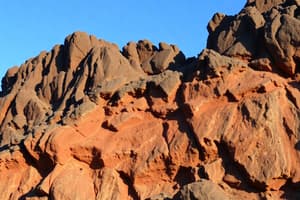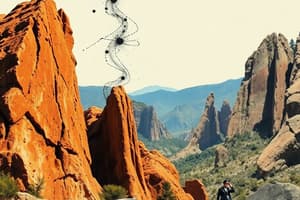Podcast
Questions and Answers
How do igneous rocks generally form?
How do igneous rocks generally form?
Which type of rock is formed from the rapid solidification of magma?
Which type of rock is formed from the rapid solidification of magma?
How do metamorphic rocks form?
How do metamorphic rocks form?
Which rock type does not participate in the rock cycle?
Which rock type does not participate in the rock cycle?
Signup and view all the answers
What is the correct general sequence of rock types in the rock cycle?
What is the correct general sequence of rock types in the rock cycle?
Signup and view all the answers
Which rock type is not directly related to the igneous process?
Which rock type is not directly related to the igneous process?
Signup and view all the answers
How do sedimentary rocks form?
How do sedimentary rocks form?
Signup and view all the answers
Which of the following rocks is formed from the compaction and cementation of sediments?
Which of the following rocks is formed from the compaction and cementation of sediments?
Signup and view all the answers
What are the basic classes based on which igneous rocks are classified?
What are the basic classes based on which igneous rocks are classified?
Signup and view all the answers
How does an igneous rock transform into a metamorphic rock in the rock cycle?
How does an igneous rock transform into a metamorphic rock in the rock cycle?
Signup and view all the answers
Study Notes
The Rock Cycle Quiz: 20 Questions
Hop aboard our geological adventure as we dive into the fascinating world of rocks and their transformations through the rock cycle!
Igneous Rocks Formation
- How do igneous rocks generally form? a. Through sedimentation and compaction b. From lithified fossils c. By cooling and solidifying of magma or lava d. By metamorphic processes
Answer: c. By cooling and solidifying of magma or lava
- Which of these igneous rocks forms from the rapid solidification of magma? a. Pumice b. Granite c. Sandstone d. Basalt
Answer: a. Pumice
Metamorphic Rocks Formation
- How do metamorphic rocks form? a. From the solidification of magma b. Due to igneous rock cooling c. Through the action of heat and pressure on existing rocks d. From the accumulation of sediments
Answer: c. Through the action of heat and pressure on existing rocks
- Which of the following metamorphic rocks is formed from the alteration of limestone and shale? a. Marble b. Pumice c. Sandstone d. Basalt
Answer: a. Marble
Rock Cycle Processes
- The rock cycle involves the three main types of rock. What are they? a. Magmatic b. Metallic c. Sedimentary d. Metamorphic
Answer: a. Magmatic, c. Sedimentary, d. Metamorphic
- Which type of rock does not participate in the rock cycle? a. Granite b. Limestone c. River sand d. Iron
Answer: d. Iron (Iron is a metallic element, not a rock)
- The rock cycle can be illustrated as a continual flow of rock types under certain conditions. What is the general sequence of rock types in the rock cycle? a. Magmatic, Metamorphic, Sedimentary, Magmatic b. Metamorphic, Sedimentary, Magmatic, Metamorphic c. Sedimentary, Magmatic, Metamorphic, Sedimentary
Answer: c. Sedimentary, Magmatic, Metamorphic, Sedimentary
- Which rock type is not directly related to the igneous process? a. Pumice b. Sandstone c. Granite d. Marble
Answer: b. Sandstone
Sedimentary Rocks Formation
- How do sedimentary rocks form? a. From the solidification of magma b. Through the action of heat and pressure on existing rocks c. Through the accumulation and compaction of sediments d. From the alteration of limestone and shale
Answer: c. Through the accumulation and compaction of sediments
- Which of the following rocks is formed from the compaction and cementation of sediments? a. Marble b. Pumice c. Sandstone d. Basalt
Answer: c. Sandstone
Rock Types Classification
- Igneous rocks are classified based on their texture and composition. What are their basic classes? a. Felsic b. Mafic c. Metallic d. Sedimentary
Answer: a. Felsic, b. Mafic
- In the rock cycle, how does an igneous rock transform into a metamorphic rock? a. Through the solidification of magma b. By cooling and solidifying of lava c. Through the action of heat and pressure
Answer: c. Through the action of heat and pressure
- What is the main difference between a metamorphic rock and a sedimentary rock? a. The main difference lies in the processes that form them b. Metamorphic rocks are younger than sedimentary rocks c. Metamorphic rocks contain fossils while sedimentary rocks do not
Answer: a. The main difference lies in the processes that form them
- Which rock type is formed from the cementation and compaction of organic matter and other sediments containing fossils? a. Pumice b. Granite c. Sandstone d. Marble
Answer: c. Sandstone
- In the rock cycle, how does a sedimentary rock transform into an igneous rock? a. Through the solidification of magma b. By cooling and solidifying of lava c. Through the action of heat and pressure
Answer: c. Through the action of heat and pressure (specifically, when heat from the Earth's mantle melts the sedimentary rock to form magma)
- Which rock type is formed from the lithification and cementation of sediments in an oxygen-poor environment? a. Marble b. Pumice c. Sandstone d. Basalt
Answer: c. Sandstone
- What is the process by which metamorphic rocks can transform into igneous rocks? a. Through the solidification of magma b. By cooling and solidifying of lava c. Through the action of heat and pressure
Answer: c. Through the action of heat and pressure (specifically, when heat causes the metamorphic rock to melt and form magma)
- Which rock type is formed from the alteration and recrystallization of preexisting rocks under high temperature and pressure? a. Marble b. Pumice c. Sandstone d. Basalt
Answer: c. Sandstone (although this is not a common process for sandstone formation)
- How does a metamorphic rock transform into a sedimentary rock? a. Through the solidification of magma b. By cooling and solidifying of lava c. Through the action of heat and pressure
Answer: c. Through the action of heat and pressure (specifically, when heat and pressure cause the metamorphic
Studying That Suits You
Use AI to generate personalized quizzes and flashcards to suit your learning preferences.
Description
Test your knowledge about the formation and transformation of rocks in the rock cycle with this 20-question quiz. Learn about the processes behind igneous, metamorphic, and sedimentary rocks, and understand how each type contributes to the continuous cycle of rock formation.




